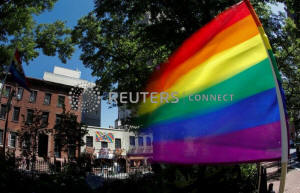|
Americans' perception of LGBTQ rights
under federal law largely incorrect: Reuters/Ipsos
 Send a link to a friend
Send a link to a friend
 [June 11, 2019]
By Maria Caspani [June 11, 2019]
By Maria Caspani
(Reuters) - Almost half of all Americans
incorrectly believe that federal law protects lesbian, gay and bisexual
people from discrimination on the basis of sexual orientation, according
to a Reuters/Ipsos opinion poll released this week.
A month ago, the Democratic-controlled U.S. House of Representatives
passed the Equality Act, which would codify anti-discrimination
protections for LGBTQ people in areas such as healthcare and housing
into federal law.
But the bill faces stiff opposition in the Republican-controlled Senate
and the administration of President Donald Trump, a Republican, opposes
the bill on the grounds that it threatened "to undermine parental and
conscience rights."
Some supporters of the bill say the disconnect between the public
perception and the actual protections afforded to LGBTQ people shows a
need to drum up support for the legislation.

"The public might be getting the sense that we're fully integrated in
society and that we live a trouble-free life, and that is a challenge
for my organization," said Stacey Long Simmons, director of advocacy and
action at the National LGBTQ Task Force, which works on behalf of
lesbian, gay, bisexual, transgender and other queer people.
The Reuters/Ipsos poll, conducted with the Williams Institute at the
University of California at Los Angeles, was released as New York
prepares to mark the 50th anniversary of the spontaneous rioting that
erupted outside the Stonewall Inn gay bar in Greenwich Village in
protest at police harassment.
The demonstration on June 28, 1969 gave rise to the worldwide movement
for LGBTQ equality.
Supporters of the Equality Act believe federal safeguards are necessary.
In 30 U.S. states, LGBTQ people are at risk of being fired, evicted from
their homes and denied services because of their sexual orientation and
gender identity, according to the Human Rights Campaign, the largest
U.S. advocacy group for the LGBTQ community.
"When you talk to people across the country, regardless of where they
stand on LGBTQ equality, so many don't know that in 30 states LGBTQ
people are still at are risk of being fired solely because of their
gender identity or sexual orientation," said Charlotte Clymer, HRC's
press secretary for rapid response. "These things are flying under the
radar for most Americans."
HRC said in its 2018 State Equality Index that 17 states and Washington,
D.C. have robust LGBTQ non-discrimination laws for employment, housing
and things such as obtaining credit and insurance.
'MOSTLY WRONG' PERCEPTION
The Reuters/Ipsos poll found that 45% of respondents believed federal
anti-discrimination protections already exist for lesbian, gay and
bisexual people, including 40% of those aged 18-34 and 57% of registered
Republicans. Only 23% said they were not protected at the federal level.
Only one in three respondents knew that transgender people were not
protected from gender identity discrimination under federal law. The
rest either said they did not know, or they believed - incorrectly -
that transgender people already had federal protections.
[to top of second column]
|

A rainbow flag waves in the wind at the Stonewall National Monument
outside the Stonewall Inn, site of the1969 Stonewall uprising,
considered the birth of the lesbian, gay, bisexual and transgender (LGBT)
movement in Greenwich Village in New York City, New York, U.S., June
4, 2019. REUTERS/Mike Segar/File Photo

"We're working so very hard to set a ground game about the Equality
Act so that people understand that their common perception is mostly
wrong," said Long Simmons, whose group is trying to build support
among lawmakers and constituents.
Opponents of the Equality Act see legislation as unnecessary and a
threat to religious freedoms, such as business owners who object on
religious grounds to serving same-sex couples.
The poll indicates that most Americans do not think religious
objections should be a reason to deny service to an LGBTQ person,
whether in business (57%), healthcare (64%) or employment (62%).
In the survey, only 20% of respondents said that LGBTQ people are
treated "about the same" in the U.S. military, while 43% percent
said they are treated worse.
"I think that's got to be an awareness of the Pentagon and the Trump
administrationís decisions to make it impossible for trans people to
serve authentically," said Kerith Conron, a research director at the
Williams Institute.
In January, the U.S. Supreme Court lifted lower court rulings that
blocked a Trump administration ban on certain transgender people
from serving in the U.S. military, allowing the policy to go into
effect.
The ban is one of several steps taken to curtail LGBTQ rights, after
a decade of change that included the legalization of same-sex
marriage nationwide in 2015 under the LGBTQ-friendly administration
of President Barack Obama, a Democrat.

Last month, the Trump administration proposed rules that would roll
back protections for transgender patients under the Affordable Care
Act, or Obamacare, and allowing homeless shelters to turn away
transgender people for religious reasons.
In the poll, 43% of Americans said LGBTQ people were treated "about
the same" as people who do not identify as LGBTQ in obtaining access
to healthcare from doctors and hospitals. Only 17% say they are
treated worse, and about 1 in 3 said they did not know.
"It's been a struggle and that's the weird thing about things that
we take for granted," HRC's Clymer said. "You'll see people support
these issues of equality and yet maybe not be fully informed on
their status."
The Reuters/Ipsos poll was conducted online on May 29-30 and June
5-6 in English throughout the United States. It gathered responses
from 2,237 adults and has a credibility interval, a measure of
precision, of 2 percentage points.
(Reporting by Maria Caspani in New York; Editing by Frank McGurty
and Grant McCool)
[© 2019 Thomson Reuters. All rights
reserved.]
Copyright 2019 Reuters. All rights reserved. This material may not be published,
broadcast, rewritten or redistributed.
Thompson Reuters is solely responsible for this content. |